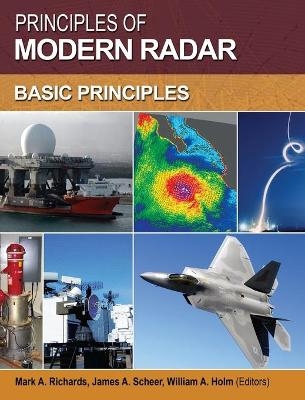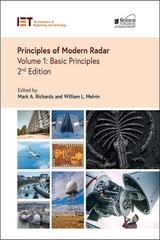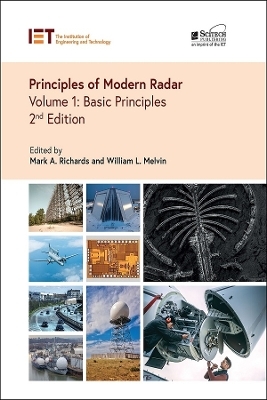
Principles of Modern Radar
SciTech Publishing Inc (Verlag)
978-1-891121-52-4 (ISBN)
Principles of Modern Radar: Basic Principles is a comprehensive and modern textbook for courses in radar systems and technology at the college senior and graduate student level; a professional training textbook for formal in-house courses for new hires; a reference for ongoing study following a radar short course; and a self-study and professional reference book.
Principles of Modern Radar focuses on four key areas:
Basic concepts, such as the the radar range equation and threshold detection
Radar signal phenomenology, such as radar cross section models, clutter, atmospheric effects, and Doppler effects
Descriptions of all major subsystems of modern radars, such as the antenna, transmitter, receiver, including modern architectural elements such as exciters, and advanced signal processors
Signal and data processing basics, from digital signal processing (DSP) fundamentals, through detection, Doppler processing, waveforms and pulse compression, basic imaging concepts, and tracking fundamentals.
While several established books address introductory radar systems, Principles of Modern Radar differs from these in its breadth of coverage, its emphasis on current methods (without losing sight of bedrock principles), and its adoption of an appropriate level of quantitative rigor for the intended audience of students and new professional hires.
The manuscript for this book was reviewed by over 50 professionals in academia, military, and commercial enterprises. These reviewers were among thousands of potential users approached by the publisher and asked to share their expertise and experience in radar training and instruction. Their extensive comments, corrections, and insights ensure that Principles of Modern Radar will meet the needs of modern radar educators and students around the world. Written and edited by world-renowned radar instructors and critically reviewed by users before publication, this is truly a radar community-driven book.
Mark Richards is a faculty member in Electrical and Computer Engineering at the Georgia Institute of Technology, teaching and conducting research in the areas of digital signal processing, radar signal processing, and high performance embedded computing. He was previously Chief of the Radar Systems Division in the Sensors and Electromagnetic Applications Laboratory of the Georgia Tech Research Institute (GTRI). He is the author of Fundamentals of Radar Signal Processing (McGraw-Hill, 2005), as well as co-editor or contributor to four other books. He received his Ph.D. from Georgia Tech in 1982. Jim Scheer has 40 years of hands-on experience in the design, development, and analysis of radar systems. He currently consults and works part time for GTRI and teaches radar-related short courses. He began his career with the General Electric Company (now Lockheed Martin Corporation), working on the F-111 attack radar system. In 1975 he moved to GTRI, where he worked on radar system applied research until his retirement in 2004. Mr. Scheer is an IEEE Life Fellow and holds a BSEE degree from Clarkson University and the MSEE degree from Syracuse University. Bill Holm is the associate vice provost for distance learning & professional education at Georgia Tech, program director for the defense technology professional education program, and is a principal research scientist at GTRI. His research in radar technology, signal processing techniques, and related subjects has resulted in over 75 technical papers, research papers, and book chapters. His 30+ years of instruction experience include the Principles of Modern Radar and Basic Radar Concepts short courses and teaching in the School of Physics. Dr. Holm holds a Ph.D. degree in physics from Georgia Tech.
Part I: Overview
Chapter 1: Introduction and Radar Overview
Chapter 2: The Radar Range Equation
Chapter 3: Radar Search and Overview of Detection in Interference
Part II: External Factors
Chapter 4: Propagation Effects and Mechanisms
Chapter 5: Characteristics of Clutter
Chapter 6: Target Reflectivity
Chapter 7: Target Fluctuation Models
Chapter 8: Doppler Phenomenology and Data Acquisition
Part III: Subsystems
Chapter 9: Radar Antennas
Chapter 10: Radar Transmitters
Chapter 11: Radar Receivers
Chapter 12: Radar Exciters
Chapter 13: The Radar Signal Processor
Part IV: Signal and Data Processing
Chapter 14: Digital Signal Processing Fundamentals for Radar
Chapter 15: Threshold Detection of Radar Targets
Chapter 16: Constant False Alarm Rate Detectors
Chapter 17: Doppler Processing
Chapter 18: Radar Measurements
Chapter 19: Radar Tracking Algorithms
Chapter 20: Fundamentals of Pulse Compression Waveforms
Chapter 21: An Overview of Radar Imaging
Appendix A: Maxwell's Equations and Decibel Notation
Appendix B: Answers to Selected Problems
| Erscheint lt. Verlag | 30.6.2010 |
|---|---|
| Reihe/Serie | Radar, Sonar and Navigation |
| Verlagsort | New York |
| Sprache | englisch |
| Maße | 203 x 254 mm |
| Themenwelt | Technik ► Nachrichtentechnik |
| ISBN-10 | 1-891121-52-9 / 1891121529 |
| ISBN-13 | 978-1-891121-52-4 / 9781891121524 |
| Zustand | Neuware |
| Informationen gemäß Produktsicherheitsverordnung (GPSR) | |
| Haben Sie eine Frage zum Produkt? |
aus dem Bereich



